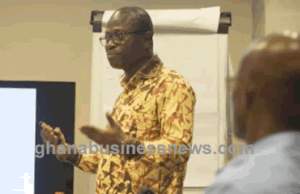Ghanaian journalist makes significant contribution to NBR report on Africa-China relations

When the US-based National Bureau of Asian Research (NBR) published its Special Report No. 100 on June 1, 2022, one of the chapters in the remarkable preliminary study was contributed by a Ghanaian journalist.
The journalist Emmanuel K Dogbevi, the Managing Editor of Ghana Business News was in good company with other outstanding scholars who wrote chapters in the five-chapter report titled Political Front Lines: China’s pursuit of influence in Africa.
The other authors are Mareike Ohlberg, a Senior Fellow in the Asia Programme at the German Marshall Fund, in Berlin, Jean-Pierre Cabestan, a Senior Research Fellow at the French National Centre for Scientific Research and a Research Professor at Hong Kong Baptist University and Paul Nantulya, a Research Associate at the Africa Center for Strategic Studies in Washington DC. The report was edited by Nadège Rolland, Senior Fellow for Political and Security Affairs at the NBR.
The NBR is an independent research institution based in Seattle and Washington, DC.
“We bring world-class scholarship to bear on the evolving strategic environment in Asia through original, policy-relevant research, and we invest in our future by training the next generation of Asia specialists,” it says on its website.
Rolland in her introduction wrote: the report examines the understudied field of China’s political influence activities in Africa and describes the united front system’s attempts to manage overseas Chinese communities, co-opt African elites, and shape the perception of wider African audiences. When Rolland and her team started preparing the report, they felt Dogbevi, whose extraordinary journalism is well known around the world was the right person to be assigned the work.
“I was surprised when I received the email from the Bureau. Because before then, I wasn’t familiar with them. I might have come across their works, but their name didn’t stick at first,” Dogbevi said about the initial email inviting him to write the chapter.
Dogbevi’s essay titled China in Africa’s media: A case study of Ghana, considers the country as a case study of China’s strategy to influence media in Africa and thereby strengthen its foothold on the continent.
In his main argument, he writes: “China’s ambition to be a major player in global geopolitics is no secret. It has also not lost sight of the fact that the media and information management and control are important tools in the achievement of that endeavor. Ghana presents an interesting case study of China’s well-laid strategy in not only influencing the media in Africa but also controlling what the media publishes about China. To achieve this, Beijing has launched a multipronged approach, including engaging the media directly by sponsoring African journalists’ visits to China to cultivate how the media should function from China’s perspective. In exerting its soft power, China has also used control mechanisms, such as speaking directly to governments and journalists, and has demanded what it regards as positive news coverage of its activities and citizens in Africa. It has also invested in existing media organizations to ensure positive coverage of news about China, as well as established replicas of state-owned Chinese media in African countries. Further, China has in some cases openly expressed displeasure over news coverage it deems “unfair” and “defamatory.”
Asked to reflect over the work Dogbevi said, he believes that journalism isn’t simply an enterprise about reporting what others say. “It involves digging deeper to uncover truths and illuminate. It is also an intellectual pursuit, and journalists must therefore develop their capacity to do deep analysis of issues affecting their societies,” he added.
He also stated that Ghanaian journalists, unlike their counterparts in other countries such as South Africa or Kenya, have to do much more to gain respect, because of the generally poor quality of journalism practice in the country.
“The general public must also be blamed for the trend in journalism in the country, because they seem more accustomed to sensationalism rather than serious journalism, which over time has compelled many news houses to focus on what tickles them rather than important stories that would lead to change,” he said.
It’s not surprising that Dogbevi was chosen for what he describes as “no mean feat”, because he has been consistent in his line of reporting over the years. He has continued to cover difficult issues and subjects in a country where it is becoming hard to do critical reporting, particularly investigative reporting that exposes debilitating corruption, abuse of power and holds the powerful to account.
He has also continued to do these important kinds of journalism with little and in most cases no resources – such as funds, and the human resources that these kinds of works require, and over the years his impactful works have led to legislation, international bans, and discussions in universities around the world.
Dogbevi has a Bachelors degree in Sociology from the University of Ghana and a Masters degree in Journalism from Columbia University in the City of New York, where he is also a Knight-Bagehot Fellow in Business and Economic Journalism.
By Peter Quarshie
Copyright ©2022 by NewsBridge Africa
All rights reserved. This article or any portion thereof may not be reproduced or used in any manner whatsoever without the express written permission of the publisher except for the use of brief quotations in reviews.
